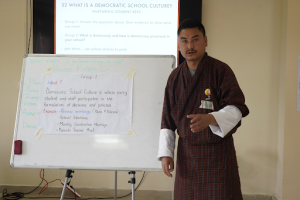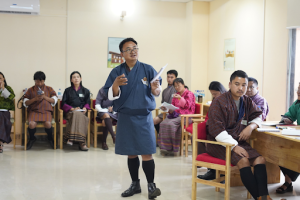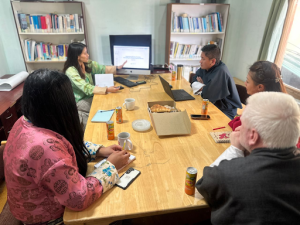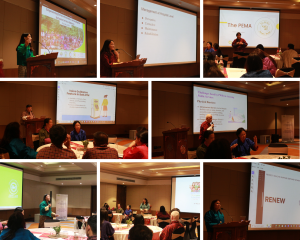May eNews
Workshop on Nurturing Student Representatives
A Training of Trainers (ToT) Workshop on Nurturing Student Representatives was conducted from 6th – 8th May in Tsirang District. The objective of this workshop was to equip Educators with the necessary tools and strategies to foster a Democratic School Culture and Empower Student Representatives. A total of 28 teachers from nine schools within Tsirang district attended the workshop.
The initiative was aimed at promoting active student participation and fostering civic engagement within educational institutions.The session emphasised the significance of cultivating a Democratic School Culture as a foundational step towards nurturing responsible citizenship among the young minds. Participants identified existing practises of a Democratic School Culture, including student participation in decision-making, involvement of student body representatives in all school administration meetings, school leadership election, and community involvement. The participants were also introduced to the tools for promoting a more participatory and democratic culture within the school environment.

Teachers collectively discover the importance of parental engagement and inclusivity in fostering democratic ethos in the schools and society.
One of the participants praised the idea of including student leaders’ opinions in school policies and involving them in coordination meetings as a way to teach democratic values to students. In addition, students become empowered as well as responsible for decisions that affect their own lives and those of their cohort.

The event was implemented through the project, “ Project Mikhung (2.0): Capacitating the Local Government and citizens to strengthen people-centred planning,” supported by the Bhutan Foundation.
Empowering Service Providers: Advocating for Inclusive Service Delivery
BCMD convened two- rounds of consultation with six CSOs on the 8th and 17th of April 2024 to co-create the programme on Empowering Service Providers: Advocating for Inclusive Service Delivery with the following objectives:
- Raise awareness among service providers about the importance of inclusive service delivery, which also efficiently caters to the different needs of vulnerable populations
- Enhance the capacity and understanding of service providers to accommodate the diverse needs of vulnerable groups
- Foster collaboration between service providers and relevant stakeholders to improve service provision for vulnerable populations

The final one day advocacy event was held on 31st May in Le Meridien, Thimphu on the theme, ‘Empowering Service Providers for Inclusive Service Delivery.’ More than 60 participants from partner CSOs, relevant government offices, law enforcement, Wangsel Institute for the Deaf, corporations and financial institutions attended the event.

The followingCSOs and organisations presented at the event:
1. Ability Bhutan Society (ABS) & Disabled People’s Organization of Bhutan (DPoB) , and Phensem Parent Group further highlighted the challenges faced by the vulnerable groups and parents of children born with disabilities through their personal and lived- experiences. This brought to the forefront the opportunities and possibilities that the Bhutanese Society could collectively achieve in making every Bhutanese child a productive human being. The highlight of the presentation was on the need for an inclusive approach to catering to the needs of all vulnerable sections of Bhutanese society, vulnerable children, women, youths, People with Disabilities, and parents and/or caregivers of children living with neuro-developmental disorders, LGBT+, etc.
2. Respect, Educate, Nurture and Empower Women (RENEW): highlighted the services that it rendered to its beneficiaries through its various programmes.
3. Jigme Dorji Wangchuck National Referral Hospital (JDWNRH): Ms. Dechen Tshomo, Occupational Therapist from JDWNRH, presented the medical perspectives on the needs and challenges of Persons with 4. Disabilities and sensitised the gathering that disability is not a choice but a medical condition and that it needed empathy and appropriate response from society.
4. The PEMA Secretariat: presented the services it offers, catering to the needs of those dealing with mental health issues through their four-pronged approach of I) Prevention & Engagement, II) Response Services, III) Treatment and Rehabilitation, and IV) Reintegration and Aftercare. Through an interactive session, it also generated an opportunity to understand the challenges faced by the vulnerable groups in the area of mental health and wellbeing, in addition to identifying opportunities for relevant CSO-collaboration with The PEMA on policies and implementation gaps and addressing these gaps.
5. Jigme Singye Wangchuck (JSW) Law School: presented the legal framework and legal recourse that people living with disabilities and other vulnerable groups could take to access justice in a fair, transparent and equitable manner. The presentation also highlighted the current challenges in terms of limited understanding of accessing justice and emphasised the need to make legal service delivery more inclusive as well as enable all people to access their rights and understand their responsibilities appropriately.
6. Financial Institutions (FIs): Representing the FIs, the Bank of Bhutan (BoB) presented the various initiatives undertaken within the bank targeting the needs of the vulnerable groups and enabling them easy access to its services such as-
i) Voice guidance feature- BoB offices in Thimphu, Paro, Phuntsholing and Samtse ensure visually impaired people independently perform their financial transaction.
ii) Audio notification in Mbob: Both IOS and Android have audio notifications for every transaction.
iii) Dzongkha language services: Both Mbob and the website have the Dzongkha language.
iv) Braille numberings: Elevator /ATM has a braille numbering to better navigate the services.
vi) Dedicated facilities: Dedicated washroom facilities and wheelchair-friendly environment in and around the bank premises for disabled people to ensure comfort and convenience.
vii) Priority counter service: Since 2021, BoB has implemented priority counter services, allowing pregnant individuals, elders, and persons with disabilities to access banking services efficiently, reaffirming BoB’s commitment to equal access for all.
viii) Gender and non-discriminatory policy: Whenever there is a new recruit, they are briefed on the gender policy and again reminded during the annual branch managers’ meeting.
This event stemmed from the two Design Thinking (DT) workshops and online campaign titled, #peoplecentredpolicy organised by BCMD in 2023. Among the numerous recommendations put forth, the common concern that emerged then was the accessibility of information and services by nearly all the vulnerable groups, and across various demographics, indicating a critical need for intervention. These interventions were made possible through the funding support received from the Fund for Innovation and Transformation (FIT).
This event was also covered by National Media- https://www.bbs.bt/news/?p=204458
